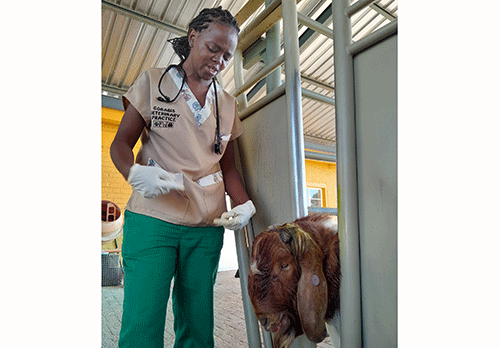GOBABIS – As the famous adage goes, “A father’s love and guidance are more than a hundred schoolmasters.”
It is exactly that father’s love that inspired young Vezemba Uandara to pursue a career in animal health.
As it is wonted with any ordinary girl, born and raised in a traditional African set-up, she could have chosen to become a dentist, nurse, lawyer, teacher or any other profession that is widely considered sophisticated – but deep down, Uandara always knew what she wanted, and nothing would stand in her way.
The beginning
Although there was not much inspiration in the school set-up for what she really wanted to do, she was, however, able to fill that void at home through her father’s love and dedication towards farming and general animal care.
Through watching and following her father around, she already knew at a young age that the only place that would calm her soul and ignite her passion was the cattle kraal.
“I grew up in front of all sorts of animals that my father farmed with – and seeing them every day made me develop even more love for them. I was raised by a strict father, who always insisted that I go to the kraal along with the others whenever there were activities to be done. Even during school holidays, my only happy place was in the cattle and goats’ kraal. He [father] was a passionate farmer and a big lover of animals,” she shared.
“May my dad’s soul rest in peace, as he is no more with us now – but he is the one person who inspired me to pursue a career in animal health care and farming in general. Farming and helping animals have now become my life –and I truly enjoy what I do.”
After completing high school at Ella du Plessis in 2012 in Windhoek, Uandara left for Zimbabwe to pursue an Honors Degree in Livestock and Wildness Management, which she completed in 2017, thanks to a Social Security Commission bursary.
She now works at the Gobabis Veterinary Practice as an assistant, under the tutelage of Dr Christian Lichtenberg. She joined the practice in 2017 as an intern before she was permanently appointed.
Uandara says she is learning every day, and if she had to choose a new career path again, it would still be anything that has to do with farming and animal healthcare
“The most rewarding thing about my profession is that I get to learn from the best every day, make a difference and bring joy to the lives of animals and their owners. A typical day for me at the practice involves checking up on sick animals, helping farmers and mostly working closely with the practice doctors on the various animals admitted here.”
Sharing
Not only that – but on weekends, she gets to share her knowledge with upcoming farmers within surrounding areas of Gobabis and also assist with animals at various agricultural shows around the Omaheke region and beyond.
“I have learned a lot about the general handling of animals, diagnoses of different diseases and being able to treat sick animals. Mostly, I learn here at the practice – and on weekends, I go back home to do farming with the experience I have gained as an assistant. Most of the farmers here are communal farmers, and we help them with health management of both small stock and large
stock.”
Uandara says the old-fashioned stereotypes of women being frowned upon when seen wearing overalls at a veterinary practice and attending to sick animals, are a thing of the past, as there are now enough female role models to inspire any girl-child wanting to join the field.
“But I would like to encourage young females to pursue a career in any agriculture-related field – whether it’s veterinary, medicine or animal health courses. We need more women in farming and generally in the agricultural sector. The future is in agriculture, and women can do it even better than anyone out there doing it.
“Also, more health and management courses should be offered locally and in communal areas. There is a gap in educating our farmers about the basic things like even injecting your dog, small livestock, large livestock, etc.”
Representation
Despite the low representation of females in her field, she is happy with the level of respect and recognition they receive from the general public and clients.
“Yes, I really think we get the necessary respect and recognition as professionals. Women can be farmers and have the capabilities to excel equally as men. Get your veldskoen on and get dirty in the kraal. Farming is the future, fellow ladies and young people,” she concluded.


